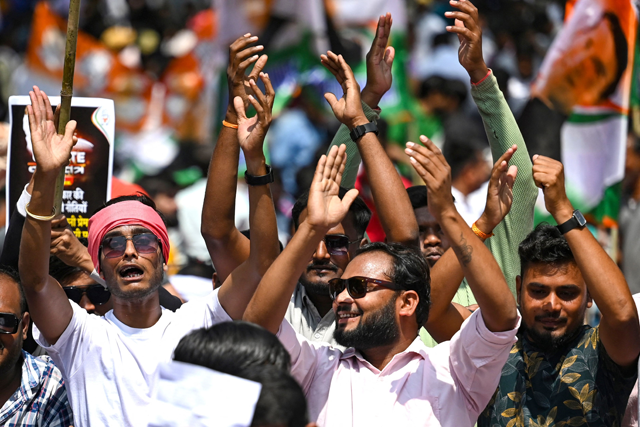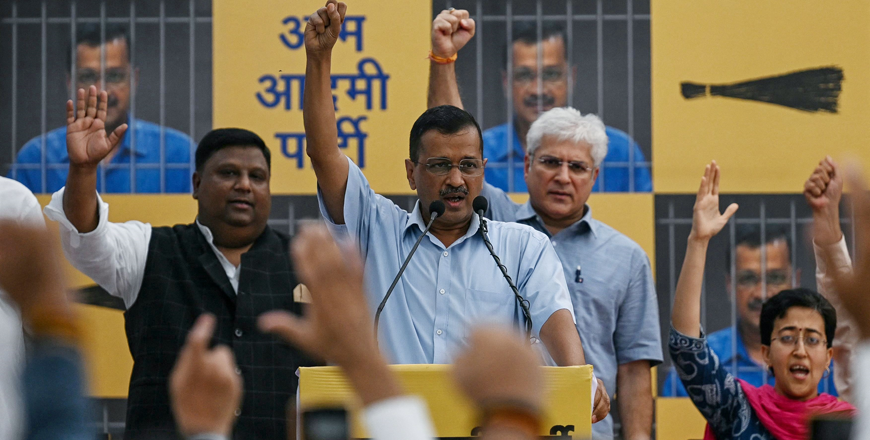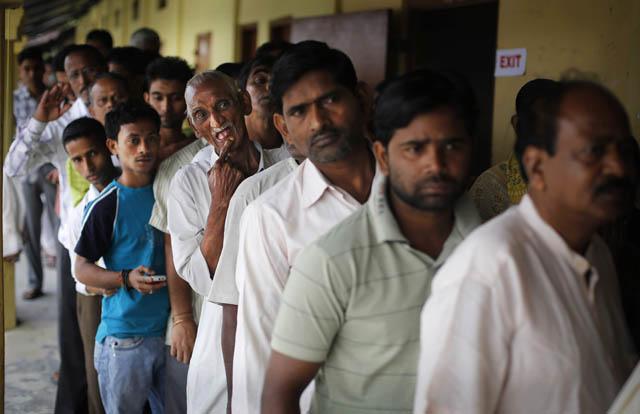You are here
India’s parliament adjourned after protests over Gandhi expulsion
By AFP - Mar 27,2023 - Last updated at Mar 27,2023

India’s Congress Party activists and supporters protest against conviction of Congress Party leader Rahul Gandhi in a criminal defamation case, in New Delhi, on Monday (AFP photo)
NEW DELHI — India’s parliament was adjourned on Monday after noisy protests by opposition lawmakers over the expulsion from the house of top opposition figure Rahul Gandhi.
Gandhi was stripped of his parliamentary seat on Friday in a move that critics say heightens concerns about creeping authoritarianism in the world’s largest democracy.
Prime Minister NarendraModi’s Hindu nationalist government has been widely accused by political opponents and rights groups of using the legal system to target and silence critics.
Members of Gandhi’s opposition Congress Party wore black shirts and scarves as parliament opened on Monday. Some threw paper at the speaker, who then adjourned proceedings.
“I want to run the House with dignity,” Speaker Om Birla said. “Proceedings of the House are adjourned till 4 pm.”
Gandhi’s expulsion came a day after he was convicted of defamation in Modi’s home state of Gujarat for a 2019 campaign-trail remark seen as an insult to the premier.
Gandhi, 52, is the leading face of Congress, once the dominant force of Indian politics but now a shadow of its former self.
He is the scion of India’s most famous political dynasty and the son, grandson and great-grandson of former prime ministers, beginning with independence leader Jawaharlal Nehru.
But he has failed to challenge the electoral juggernaut of Modi’s Bharatiya Janata Party (BJP) and its nationalist appeals to India’s Hindu majority.
The lower house of parliament ruled him ineligible to continue sitting as an MP on Friday, a day after his conviction in the defamation case.
The prosecution stemmed from a remark made during the 2019 election campaign, during which Gandhi had asked why “all thieves have Modi as [their] common surname”.
His comments were portrayed as a slur against the prime minister, who went on to win the election in a landslide.
Members of the government also said the remark was a smear against all those sharing the Modi surname, associated with the lower rungs of India’s traditional caste hierarchy.
Gandhi was sentenced to two years imprisonment on Thursday but walked free on bail after his lawyers vowed to appeal.
A BJP spokesman said Thursday the court acted with “due judicial process” in arriving at its judgement.
Legal action has been widely deployed against opposition party figures and institutions seen as critical of the Modi government in recent years.
Gandhi faces several other defamation cases and a money-laundering case that has been snaking its way through India’s glacial legal system for more than a decade.
The Editors Guild of India said there is also a wider “trend of using government agencies to intimidate or harass press organisations that are critical of government policies”.
On Saturday, Gandhi, who recently completed a walk across India that was hailed as a success by commentators, said he would “do whatever I have to do to defend the democratic nature of this country”.
Related Articles
NEW DELHI — India’s six-week election was staggering in its size and logistical complexity, but also in the “unprecedented” scale of online
Indians began voting Monday in the world’s biggest election, which is set to sweep the Hindu nationalist opposition to power at a time of low growth, anger over corruption and warnings about religious unrest.
Voters went to the polls in New Delhi on the first major day of India’s marathon national election Thursday, with the capital a key battleground for a new anti-corruption party which shot to fame last year.














